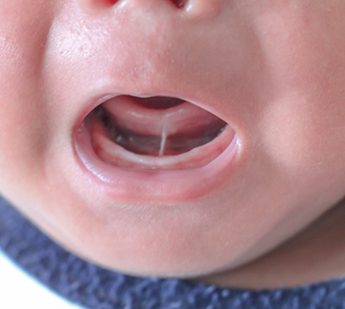More Attractive Place?
Tongue Tie Treatment Denton
Improving Oral Mobility for a Better Quality of Life

Have you noticed something is off about your or your child’s speech? Or perhaps they’re struggling to breastfeed properly? Or is your child snoring or restless during sleep? It may be the result of a restrictive tongue or lip tie. For parents of children with restrictive tongue or lip ties, challenges during breastfeeding and speech development might be early indicators. In adults, tongue ties can affect speech and swallowing and may contribute to snoring and sleep apnea by affecting the size of the airway during sleep.
Early detection and appropriate treatment are crucial for improving the quality of life for individuals affected by restrictive tongue or lip ties. Proper treatment often requires working closely with other professionals, including Myofunctional and Speech Therapists, Postural Therapists, ENTs. When the patient is ready for the surgical release of the restrictive tie, Dr Ruehle and Dr Eide have a gentle and minimally invasive laser tongue-tie treatment in Denton for infants, children, and adults.
Why Choose Garden Oaks Family & Cosmetic Dentistry for Tongue-Tie Treatment?
- Dentists Treat Children and Patients of All Ages
- Laser Dentistry Used for Safer, More Comfortable Care
- Multiple Payment Options Available
What Is Tongue-Tie?

Tongue-tie, medically known as ankyloglossia, is a congenital condition where the strip of skin beneath the tongue, known as the lingual frenulum, is shorter or tighter than normal. This restricts the range of motion of the tongue, potentially leading to a variety of issues. Between four to 11 percent of babies are born with this condition, where a band of tissue connects the tip of the tongue to the floor of the mouth, affecting normal function.
Common symptoms encompass difficulties with breastfeeding, speech articulation, and, in some cases, dental concerns. While present from birth, tongue-tie may not always be immediately apparent, emphasizing the importance of a professional diagnosis. Left untreated, tongue-tie can impact a child’s oral health, speech development, and nutritional intake.
How Tongue-Tie Affects You or Your Child

Depending on the severity, tongue-tie can be a serious obstacle in your child’s development that needs to be corrected. Without intervention, tongue-tie can cause:
- Trouble eating
- Speech impediments
- Inability to stick your tongue out
- Difficulty swallowing
- Improper growth and development of the mouth and jaws
- Late and inadequate cranial nerve development
- Sleep disorders
New research is showing connections between tongue-tie and enlarged tonsils and adenoids, repetitive ear infections, dental issues (orthodontic problems), neck pain, and headaches. Tongue-tie can also make it challenging to remove food from your teeth, causing oral hygiene issues over time.
Possible Treatment Options for Tongue-Tie

Fortunately, tongue-tie is often easily treatable through several means, depending on the severity of the condition. Some common treatment options include:
- Myofunctional Evaluation and Therapy: to assess and improve the patient’s ability to control tongue movements.
- Speech Therapy: Some individuals with mild cases of tongue-tie can benefit from targeted speech therapy exercises designed to improve tongue mobility and function.
- Lactation Consultation: For infants struggling with breastfeeding due to tongue tie, consulting with a lactation specialist can offer guidance on alternative feeding techniques.
- ENT Evaluation: if tonsils or adenoids are enlarged or nasal evaluation if patient is unable to breathe through nose at night.
- Frenum Release: A minimally invasive procedure where we remove the restrictive tie with a gentle and well-tolerated procedure with our lasers.
How Tongue-Tie Is Treated at Garden Oaks

Correcting a restrictive tongue or lip tie is quick and easy. We start by applying topical and local anesthetic to numb the area. Afterward, we’ll release the restrictive tie by removing the excess tissue that is limiting normal function of the lip or tongue, using state-of-the art laser technology. Lasers are the most precise and minimally invasive way to do these delicate procedures.
Our Waterlase and LightWalker lasers are award-winning dental technologies that utilize laser, air and water to gently remove tissue, decay and tooth structure. This method enables us to perform a wide range of dental treatments with little or no drilling, and minimal or no injections, providing a gentler experience and comfortable healing. Laser frenum releases require minimal to no shots and never any stitches. You or your child can go right back to play, school or work immediately.
Benefits of Treating Tongue-Tie

Addressing tongue-tie can bring about a multitude of positive changes in various aspects of life.
- Improved Speech Development: By releasing the restriction caused by tongue-tie, individuals can experience enhanced articulation and clearer speech. This can be particularly impactful for children, ensuring they develop strong communication skills from an early age.
- Facilitated Breastfeeding: Tongue-tie treatment can significantly improve breastfeeding for infants and their mothers. With increased tongue mobility, infants can latch more effectively, leading to better milk transfer and reduced discomfort for the breastfeeding parent.
- Enhanced Oral Health: Resolving tongue-tie issues can prevent potential dental problems that may arise due to improper tongue function. This includes issues like misalignment of teeth and difficulties in maintaining proper oral hygiene.
- Reduced Discomfort and Pain: Untreated tongue-tie can lead to discomfort, especially when trying to perform tasks that require extensive tongue movement. Treatment can alleviate this discomfort, leading to an overall improved quality of life.
- Greater Nutritional Intake: For infants and children, tongue-tie treatment can lead to improved eating habits. With increased tongue mobility, they can consume a wider variety of foods, ensuring they receive the necessary nutrients for healthy growth and development.
- Boosted Confidence and Self-Esteem: Resolving tongue-tie challenges can positively impact an individual’s confidence, especially in social situations that involve speaking or eating. This can lead to improved self-esteem and a more fulfilling social life.
- Prevention of Secondary Complications: Addressing tongue-tie early on can prevent potential secondary complications that may arise if the condition is left untreated, ensuring long-term oral health and well-being.
Tongue-Tie FAQs
Does a Frenectomy Hurt?
One of the many benefits of laser tongue-tie treatment (frenectomy) is how little discomfort is involved. Soft tissue lasers are able to be adjusted in intensity and are so precise they only target excess tissue. While severing the frenulum (the band of tissue that connects the tongue to the floor of your mouth) the heat from the laser also cauterizes, reducing bleeding.
Most patients will receive a small amount of local anesthetic to ensure comfort, even if the frenulum isn’t especially thick. If you or your child is worried about pain, or is anxious about their procedure, nitrous oxide sedation is a great option. Need more information? Give our Denton dental office a call.
What Could Happen If My Child Doesn’t Get Treatment for Their Tongue-Tie?
Tongue-ties have different effects at different stages of life, but it generally impacts speech, eating, and digestion. Younger children can have trouble latching during breast and bottle feeding, leading to poor weight gain.
As they age, these problems can become more pronounced as they struggle to chew solid foods or speak clearly. In some cases, untreated tongue-ties may also cause issues like poor oral posture. Over time, this can affect breathing, sleep quality, and even muscle tension in the neck and shoulders.
If you or your child has a tongue-tie, it’s best to treat it as soon as possible. Our laser frenectomies are quick, painless, and will grant improved oral mobility for a better quality of life.
What Should I Do After My Child’s Tongue-Tie Has Been Treated?
There should be little in the way of recovery necessary after a frenectomy. The laser we use will keep bleeding to a minimum and reduces the chances of complications. That said, there is still a chance the newly severed tissues will try to reattach. To prevent this, Dr. Ruehle or Dr. Eide will give you a set of stretching and cleaning instructions.
During a stretch, you’ll use clean hands to gently raise your tongue for a few seconds. You’ll also need to use a finger to wipe under the tongue a few times a day for two or three days. This keeps tissues from reattaching and gently wipes away any food debris that may be caught there.
What Are the Benefits of a Laser Frenectomy Over a Traditional Frenectomy?
Traditional frenectomies use instruments like surgical scissors and scalpels to free the tongue. While this method is effective, using a laser to perform the procedure comes with multiple benefits, such as:
- Faster treatment times
- Better precision
- Reduced pain
- Little to no bleeding
- Quicker recovery
- Reduced risk of complications
Laser frenectomies are a high-tech alternative that can not only be less scary for kids, but also less of a hassle overall. Our team is happy to offer this solution for tongue ties in Denton, helping every family get back to living life with a smile.
I Need a Checkup & Cleaning I Need a Dentist for My Child I am Worried About Gum Disease I Have a Cavity or Broken Tooth I am Missing One or More Teeth I Want to Enhance My Smile I Want a Straighter Smile I am Scared of the Dentist I'm Having Trouble Sleeping I Have a Dental Emergency View Our Services







